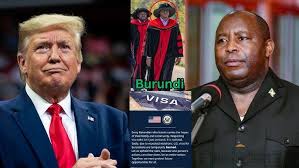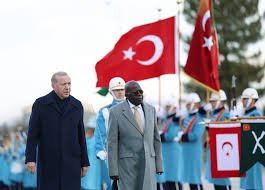The United States has temporarily banned Burundian citizens from obtaining visas and traveling to the U.S., citing repeated violations of immigration rules. The announcement was made through a statement by the U.S. Embassy in Burundi.
“Respecting visa rules isn’t just personal, it is national,” the embassy said in a post on X (formerly Twitter). “Sadly, due to repeated violations, U.S. visas for Burundians are temporarily banned. One person’s actions can close doors for an entire nation.”
While no detailed explanation was provided by U.S. officials, a 2024 U.S. Department of Homeland Security report revealed that over 15% of Burundian visitors overstayed their visas, raising serious concerns about immigration compliance.
For comparison:
49% of Chadian nationals overstayed their visas.
Only 0.15% of Japanese citizens did the same.
This ban is part of broader immigration restrictions revived under President Donald Trump, who returned to office in 2025. In June, the U.S. government suspended various visa categories—including student and medical visas—for Burundians.
Burundi is one of seven countries facing partial visa bans.
Another 12 countries (including Somalia, Sudan, Eritrea, Equatorial Guinea, and the Republic of Congo) are facing full travel bans.
The bans mostly target nations accused of having:
Weak passport controls or national ID systems.
High visa overstay rates.
Limited cooperation with U.S. immigration enforcement
A source in the Burundian government, speaking anonymously, said that talks with U.S. officials are ongoing, and they are hopeful that the decision will be reversed soon.
“We hope for a positive outcome. This affects students, medical patients, and business travelers,” the official noted.
However, there has been no formal statement from the Burundian government or President Évariste Ndayishimiye as of now.This development underscores how immigration enforcement is once again shaping U.S.-Africa relations.
Many human rights groups and African leaders have criticized such blanket bans as unfair and disproportionately harmful to students, families, and professionals from developing nations.
“Immigration policy must balance security with fairness and humanity,” said a Nairobi-based migration policy analyst.



